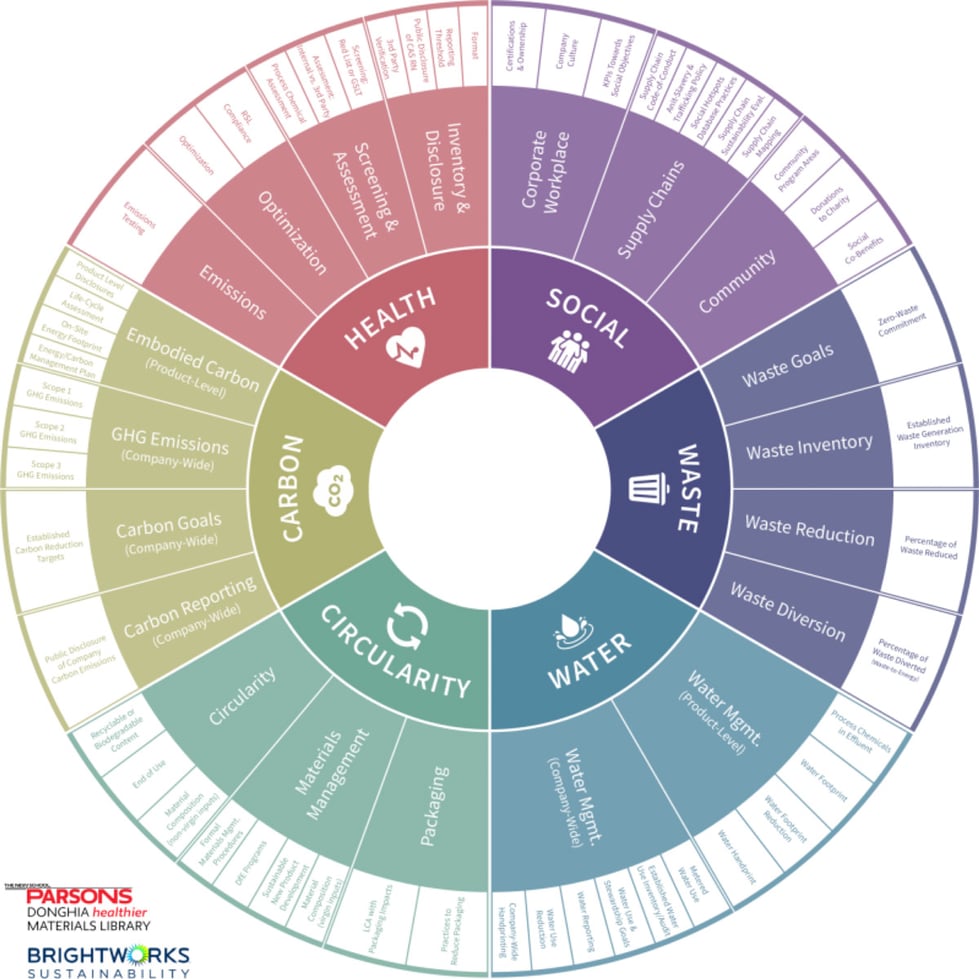SFC Academy
What Is Sustainability?
In 1987, the United Nations Brundtland Commission defined sustainability as “meeting the needs of the present without compromising the ability of future generations to meet their own needs.”
For SFC, sustainability in home furnishings specifically refers to the design, production, sale, and use of furniture to minimize negative environmental, health, and social impacts. This includes using eco-friendly materials, reducing energy and water consumption during manufacturing, ensuring product durability, and considering ethical labor practices throughout the supply chain.
SFC designs our education, working groups, webinar topics, tools, and resources based on the "Sustainability Six:" carbon, health, social, waste, water, and circularity. We encourage manufacturers, suppliers, retailers, and designers to incorporate these practices into their company policies.
Carbon Best Practices
- Responsible wood-sourcing (certified or reclaimed)
- Switch to renewable energy sources for manufacturing facilities
- Conduct Life Cycle Assessments (LCA) to identify carbon hotspots
- Set and track carbon reduction targets across operations
- Improve energy efficiency through upgraded equipment and systems (e.g. LED lighting)
- Optimize transportation and logistics to reduce fuel emissions
- Source materials locally or regionally to cut transport-related carbon emissions
- Publicly disclose emissions data and reduction progress
Health Best Practices
- Eliminate harmful chemical inputs (e.g., flame retardants, PFAS, formaldehyde)
- Choose natural, bio-based materials
- Choose low-VOC or VOC-free adhesives, finishes, and coatings
- Use certified safer materials (e.g., Greenguard Gold, Cradle to Cradle, Oeko-Tex)
- Ensure proper ventilation and indoor air quality in production areas
- Train employees on material safety and handling procedures
- Disclose material ingredients to promote transparency and safety
Social Best Practices
- Provide living wages for all workers, domestic and international
- Ensure safe and healthy working conditions
- Offer flexible hours and supportive benefits
- Foster a workplace grounded in respect, dignity, and equity for all, including women, minorities, and LGBTQ+ individuals
- Provide ongoing training and development opportunities
- Support employee wellness through programs and resources
- Engage in fair labor practices across the supply chain (if vertically integrated)
Waste Best Practices
- Implement lean manufacturing to minimize material waste
- Track and inventory scrap materials for reuse or repurposing
- Standardize material dimensions to reduce trim waste
- Reuse or repurpose production offcuts
- Avoid overproduction through accurate demand forecasting
- Reduce or eliminate single-use packaging materials
- Partner with local recyclers or upcyclers for material diversion
Water Best Practices
- Monitor and meter water use at the production level
- Conduct regular facility-wide water audits
- Install water-efficient machinery and fixtures
- Implement closed-loop or water-recycling systems
- Treat and reuse greywater where possible
- Ensure proper treatment of wastewater before discharge
- Set water reduction targets and track progress
Circularity Best Practices
- Design for disassembly
- Incorporate recycled and recyclable materials
- Plan for product repair and part replacement
- Offer refurbishment or remanufacturing programs
- Use modular designs for easy upgrades
- Eliminate toxic additives that hinder recyclability
- Reduce packaging or use reusable packaging
- Conduct Life Cycle Assessments (LCA)
- Design with cradle-to-cradle principles in mind
The Sustainable Furnishings Council (SFC) has adopted the Parson's Healthy Materials Lab & Brightworks Sustainability's "LENS" to define sustainability. This visual tool helps all home furnishings stakeholders understand the "sustainability six" in greater detail.

